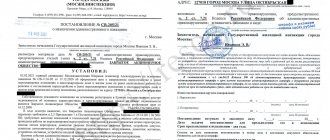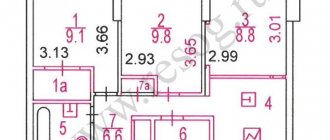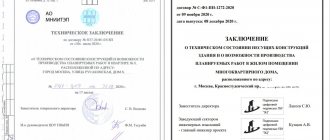Apartment owners often carry out major redevelopment without obtaining appropriate permission from the authorized bodies. In this way, property owners are trying to save time and money on coordinating planned actions. As a result, the owner is subject to a fine for remodeling the apartment without permission. In addition, other sanctions are possible in 2020.
Liability for illegal redevelopment most often arises when the owner attempts to take any civil action in relation to the apartment. In such a situation, changes made to the living space without permission become a serious problem. It often has to be resolved in court.
What is illegal redevelopment of an apartment and its signs
When planning work in residential and non-residential premises of an apartment building, you need to order a project and confirm the safety of changes to the object for the building. The conditions for the safe conduct of redevelopment work are checked during approvals from the Moscow Housing Inspectorate (Moszhilinspektsiya). This department will also check the compliance of the completed work with the project and legislative norms. The rules for design and approvals for these types of work are regulated by the Housing Code of the Russian Federation and regional regulations.
Responsibility for illegal redevelopment of non-residential premises occurs when the following violations are detected:
Dear Clients!
The article is written in general terms, but each situation requires an individual approach. Call us and an experienced engineer will answer you:
8 Moscow (our address)
All consultations are free.
- if work was carried out without the consent of the owner of the premises (for example, if it was done by tenants or tenants);
- if the required documents were not drawn up for the work (in Moscow this is not only a project, but also a technical report on load-bearing structures);
- if the project documentation was not approved by the Moscow Housing Institute, or the inspection made a refusal decision;
- if during the work, deviations from the project were made, building codes, fire and other safety rules were violated.
These rules apply not only to apartments, but also to non-residential premises of apartment buildings. For example, if an individual entrepreneur illegally remodeled the basement of a residential building, converted it for hazardous production, or created a threat to the safety of the building, he will be fined and forced to return the premises to their original (original) state.
Expert commentary. A fine for illegal redevelopment of an apartment may be collected even if you bought the property with unapproved changes. Responsibility under the Code of Administrative Offenses of the Russian Federation lies with the current copyright holder of the apartment, and it is extremely difficult to make claims against the seller. To avoid such problems, carefully check the technical documents when purchasing an apartment, compare them with the actual state of the structures and equipment of the premises. We recommend paying special attention to the red lines on the floor plans of the BTI technical passport.
If the redevelopment is carried out in violation of building codes, it will be impossible to legitimize it even through the court. For example, this applies to the demolition of load-bearing walls inside an apartment.
Who can file a complaint?
Making repairs is the legal right of the owner of the living space. But without agreement with the BTI, it is unacceptable to begin the following work:
- violation of the integrity of the load-bearing walls of the house;
- association of apartments;
- changing window sills;
- increasing the area of living quarters due to the hallway;
- moving a gas stove;
- arrangement of bathrooms not provided for during the construction of the building;
- replacement of central heating;
- conversion of residential rooms into non-residential premises.
The following changes are strictly prohibited:
- transfer of heating devices to the loggia;
- dismantling walls to combine the balcony and the room;
- expansion of the bathroom by reducing the area of living quarters;
- installation of heated floors using central heating;
- carrying out work that overloads the floors between floors.
You can find out that work is being done on the load-bearing walls by looking at the pieces of brick stuck together with cement. If workers take them out of the apartment, most likely the actions of the owner are not authorized.
What are the dangers of illegal apartment redevelopment?
To find out what the consequences of remodeling an apartment without approval are, you need to refer to the norms of the Code of Administrative Offenses of the Russian Federation. However, a fine for remodeling an apartment without permission is not the only sanction for the copyright holder. If he cannot confirm that the completed work does not threaten the reliability and stability of the building, the Ministry of Housing and Construction will issue an order to restore the object to its original condition. All expenses for such will be borne by the offender. If you do not comply with the order, a corresponding lawsuit will be filed in court.
Get an estimate of the cost of this service using our price calculator - here
Fine for illegal redevelopment under the Code of Administrative Offenses of the Russian Federation
Let's look at the consequences of illegal redevelopment of an apartment according to the law. This offense is described in Article 7.21 of the Code of Administrative Offenses of the Russian Federation. Changes were made to this norm in April 2021. Now the wording of Art. 7.21 of the Code of Administrative Offenses is as follows:
- unauthorized reconstruction and redevelopment of residential premises entails a fine for citizens from 2000 to 2500 rubles;
- if the violation is committed by an official, he will be fined in the amount of 4,000 to 5,000 rubles;
- The fine for redevelopment without permission for an organization will be from 40,000 to 50,000 rubles.
- For violations committed by an individual entrepreneur, the same fine is collected as for a legal entity. faces.
A protocol is drawn up to submit materials for collection of a fine. It will describe the elements of the offense, information about the owner and the object. Please note that paying a fine does not relieve you of the obligation to legitimize the work performed or to restore the object to its original condition.
If the redevelopment was carried out without approvals, but did not entail violations in the construction sector, it can be legalized through the Ministry of Housing and Construction.
Regional fines
Regions can also introduce fines for violating the rules for carrying out work in residential and non-residential buildings. Since the fine for remodeling an apartment is approved at the federal level, regions can hold liable:
- for violation of work rules;
- for damage, damage or destruction of an object;
- for failure to comply with the instructions of the housing inspectorate and other supervisory authorities.
The Moscow Law on Administrative Offenses provides for a fine of 4,000 rubles. for damage to residential premises in an apartment building. In addition to a fine, the violator will be required to compensate or eliminate the damage caused. To compensate for damage or compel the alteration of the premises, a separate claim is filed in civil court.
| No. | Documents used when approving redevelopment | Description |
| 1 | Title document | Only the owner can carry out redevelopment. The title document can be an extract from the Unified State Register of Real Estate, a certificate of title |
| 2 | Owners' consent | The consent of all owners of the premises is required for redevelopment. Consent must be formalized in writing and submitted for approval. |
| 3 | Redevelopment project | The project contains a description of all redevelopment work and requirements for their safety. The project can be produced by an organization consisting of SRO designers. |
| 4 | Technical conclusion | The technical report describes the condition of the load-bearing structures for redevelopment. Based on the results of the inspections, the technical report draws a conclusion about the admissibility of the work, and draws up calculations for loads and structural reinforcements. |
| 5 | Acceptance committee report | The act is drawn up in the Moscow Housing Inspectorate after completion of the work. Specialists will check that redevelopment solutions comply with the project and technical conclusion. |
| 6 | Technical plan. | The main document on the basis of which the object is placed on cadastral registration with information entered into the Unified State Register of Real Estate. After redevelopment, the technical plan indicates the new characteristics of the room. The technical plan is prepared by a cadastral engineer after examining the building. |
An example is illegal redevelopment associated with expanding the area of an apartment beyond the overall dimensions of an apartment building. Such work is prohibited, so legalization will end in refusal.
Consequences of illegal redevelopment in non-residential buildings
In non-residential buildings, redevelopment work does not need to be coordinated. More precisely, this procedure does not involve contacting the Ministry of Housing, although the owner will still have to order a technical plan and register the changes in Rosreestr. But the customer approves the project for the work himself, after which he can begin redevelopment.
Taking into account the rules set out above, there is no penalty for illegal redevelopment of non-residential premises in a non-residential building. The owner can be cited only for violating safety during work, for damaging someone else’s property, or causing harm to people.
- Expert commentary. If the redevelopment is not legalized, consequences occur only when violations are revealed. Finding out what the repairs were in someone else's apartment is quite difficult. Therefore, many facts of illegal work are not revealed. However, discrepancies in the configuration of the premises will certainly be identified when transactions are completed. This will be grounds for refusal to register the agreement.
Who can be held accountable for illegal redevelopment of residential premises?
Responsibility for redevelopment carried out without permission or in violation of building codes arises on the basis of the protocol. It can be compiled by a specialist from the Moscow Housing Inspectorate. The algorithm for bringing to responsibility is as follows:
- a scheduled inspection is carried out in the apartment building, or an extraordinary inspection based on requests from citizens and organizations;
- upon the fact of a violation, a protocol is drawn up (it will indicate the place and time of consideration of the case);
- a decision on a fine for uncoordinated redevelopment of an apartment is made by an official of the Ministry of Housing or the court (this depends on the nature of the violations identified);
- if the owner does not agree with the resolution, he can file a complaint in court.
The owner has the right not to allow unauthorized persons into the apartment without a court order (except for police actions when preventing or suppressing crimes). If MZhI specialists have information about possible violations, they can force the court to allow them into the apartment. A court order can be executed by bailiffs with the imposition of an additional fine and enforcement fee. Thus, the consequences of unauthorized redevelopment may occur even if the owner refuses to open the door.
Expert commentary. At each stage of consideration of a case on illegal redevelopment, you can defend your interests with the support of a representative. To do this, you need to issue a power of attorney through a notary. Our company’s specialists will provide assistance in preparing documents, defending during the consideration of the case and appealing.
Dear Clients!
The article is written in general terms, but each situation requires an individual approach. Call us and an experienced engineer will answer you:
8 Moscow (our address)
All consultations are free.
To coordinate the redevelopment, a project and a technical report on the condition of the load-bearing structures are ordered.
How to avoid or reduce punishment
In order not to fall under prohibitive and punitive actions from the state, you need to obtain permission for redevelopment in advance. Carrying out a permitting procedure following a major overhaul is a lottery that violators more often lose. It will be possible to reduce legal and other costs if the results of repair work are legalized in a timely manner.
For legalization it is necessary:
- Collect a package of necessary documents;
- To write an application;
- Pay the prescribed state fee;
- Submit papers to the housing commission;
- If the procedure has been completed and you have been able to obtain permission, contact the BTI to obtain a current registration certificate.
How to legalize unauthorized redevelopment in Moscow
Even if the owner was unable to avoid liability for the illegal redevelopment of the apartment, it still needs to be approved. To do this, you need to draw up and collect documents confirming the safety of the work and its compliance with construction regulations. The process of legitimation itself can take place administratively (through MZhI), or through the court. Read more about this procedure below.
Documents to legitimize uncoordinated redevelopment
Unauthorized redevelopment of residential premises can be legalized after the work is completed. To confirm that the configuration change was carried out in compliance with safety standards and does not threaten the reliability and stability of the MKD structures. The list of documents that may be required when applying to the Ministry of Housing or the court includes:
- application for approval (submitted directly to the Moscow Housing Institute or via the mos.ru website);
- statement of claim (needed when going to court if MZhI refused to legitimize);
- technical report on the condition of load-bearing structures (issued through the author of the MKD project, or through the State Budgetary Institution “Expert Center”;
- technical plan describing the new configuration and updated characteristics of the premises;
- consent of the owners of the premises;
- minutes of the general meeting of the apartment building, if the work was carried out on common property.
The exact list of documents can only be determined for a specific situation. Our company’s specialists will provide assistance with their preparation.
In this example, a floor plan was made for the premises after redevelopment.
Contacting MJI
In most cases, the consequences of illegal redevelopment of an apartment can be eliminated administratively. This procedure goes through the MJI and is characterized by the following nuances:
- the owner needs to confirm that the completed work complies with regulations and does not pose a safety hazard;
- To confirm the safety of the redevelopment, you need to obtain technical support. conclusion on the condition of the load-bearing structures of the MKD (experts will examine them and indicate conclusions about the absence of threats to reliability and strength);
- If the Moscow Housing Institute gives permission for legalization, based on the technical plan, you need to register with Rosreestr and enter new data into the Unified State Register of Real Estate.
In the process of legalization, you can generally avoid liability for unauthorized redevelopment. If the owner himself submitted documents to the Ministry of Housing, a protocol may not be drawn up. The procedure is carried out free of charge, and inspection specialists are required to make a final decision no later than 45 days.
Judicial order
In cases where the submitted documents provide ambiguous evidence of the safe performance of work, the Ministry of Housing and Inspection may refuse to legitimize. This often happens due to excessive reinsurance by officials who are afraid to make a positive decision themselves. In this case, the owner will have to go to court. Here are the main points related to the legalization of redevelopment through the courts:
- when filing a claim in court, you must confirm that the applicant went through the administrative approval procedure, but was refused;
- The main documents for proof in court will be those. conclusion on the safe condition of structures and a technical plan with new characteristics of the premises;
- for proof, you can draw up a conclusion from a cadastral engineer (it will be done by specialists from our company);
- If the court makes a positive decision, on its basis Rosreestr will enter new data into the Unified State Register of Real Estate.
You can also challenge the fine for redevelopment of non-residential premises or apartments without permission through the court. When appealing, you must prove violations committed during prosecution, or full compliance with work safety.
Expert commentary. An independent appeal to the Ministry of Housing or the court may lead to problems in legitimizing redevelopment work. Only the support of a specialist who knows the nuances of federal and regional legislation will help to avoid them. Our specialists know what issues are paid attention to during approvals and will take these points into account in advance when preparing documents.
Get an estimate of the cost of this service using our price calculator - here
What to do if services do not respond
If supervisory agencies are inactive, you need to contact higher authorities. Copies of all requests and responses to them should be kept. This rule applies to all departments, organizations, and courts.
Utility services are supervised by housing inspectorates, administrations, and Rospotrebnadzor. Housing Housing Inspectors are controlled by the Chief Housing Inspector. The prosecutor's office checks for any violations of people's rights. District prosecutors report to city, regional, and federal officials. The courts also have supervisory authorities - regional, regional, republican, and the Supreme Court of the Russian Federation.
List of useful documents
Documents for download:
| No. | Links | Description |
| 1 | Sample technical report | |
| 2 | Sample USRN extract | |
| 3 | Sample technical plan | |
| 4 | Sample redevelopment project | |
| 5 | Sample application for approval of redevelopment | |
| 6 | Application for cadastral registration | |
| 7 | Instructions for the applicant when submitting documents to the MFC | |
| 8 | Sample terms of reference for redevelopment |
Time frames and costs for legalizing unauthorized redevelopment of residential premises in apartment buildings
Illegal redevelopment of premises is not a death sentence! With proper preparation of documents and justification of the requirements, you can go through all the procedures, obtain permits and an extract from the Unified State Register of Real Estate with the new characteristics of the premises. The deadlines for legalization are determined as follows:
- technical preparation conclusions and technical plans are allowed only after inspection of objects, so it may take several days;
- 45 days are given for consideration of documents by the Moscow Housing Institute;
- the judicial procedure may take up to two months;
- registration in Rosreestr is carried out in 7 or days (depending on the method of submitting documents).
There is no need to pay for legalization in MZhI. When filing a claim in court, the state fee will be 300 rubles. (for citizens) or 6000 rub. (for organizations). Additional costs will be associated with payment for technical registration services. conclusion and technical plan. Approximate prices for services and documents can be found in the table below.
The graphic part of the technical plan for the premises records its configuration and main characteristics.
On a note
The practice of the State Housing Property Management bodies contains examples when the management organization was obliged to dismantle or legalize the redevelopment of premises in the house made by the owners. For example, in 2018, the State Housing Property Department of the Moscow Region demanded such actions from one of the administrative authorities.
Upon repeated inspection, the department found that the order had not been fulfilled: the company was fined. The management authority paid a fine of 100 thousand rubles and collected an OSS, at which the owners decided to legalize the reconstruction of the premises of the house.
Case No. A56-75945/2018 showed that the management organization in such a situation is not the proper addressee of the order, and the requirements themselves must be sent by the local government to the owners of the converted premises.
Our services
Our company employs specialists with experience in legitimizing even the most complex redevelopments. We will help:
- appeal a fine for illegal planning;
- quickly prepare documents for applying to the Ministry of Housing and the Court;
- register with Rosreestr and receive an extract from the Unified State Register of Real Estate;
- make changes to the technical passport of the BTI, as this is required by the Housing Code of the Russian Federation.
To agree on the timing and cost of services or document execution, contact our consultants and describe the situation in detail.
| No. | Service, document | Price |
| 1 | Redevelopment design | from 12,000 rub. (depends on the area and features of the object, type of work |
| 2 | Support for redevelopment approvals | from 10,000 rub. |
| 3 | Preparation of a technical plan | from 8000 rub. |
| 4 | Support of the cadastral registration procedure in Rosreestr or MFC | from 12,000 rub. |
| 5 | Drawing up a technical report | from 15,000 rub. |
The legislative framework
To correctly file a complaint, you should be guided by the following legislative acts:
- Code of the Russian Federation on Administrative Offenses dated December 30, 2001. N 195-FZ (as amended on July 31, 2020).
- Housing Code of the Russian Federation dated December 19, 2004. N 188-FZ (as amended on July 31, 2020).
- Federal Law "On the Prosecutor's Office of the Russian Federation" dated January 17, 1992. N 2202-1 (as amended on July 31, 2020).
- Criminal Code of the Russian Federation of June 13, 1996. N 63-FZ (as amended on July 31, 2020).
- Federal Law “On the procedure for considering appeals from citizens of the Russian Federation” dated May 2, 2006. N 59-FZ (as amended on December 27, 2008).
conclusions
- Illegal redevelopment may involve performing work without a design or permit, in violation of building rules and safety standards.
- Sanctions for illegal redevelopment of an apartment are specified in the Code of Administrative Offenses of the Russian Federation and provide for the imposition of a fine.
- The work performed can be legitimized through the Moscow Housing Inspectorate or the court, confirming the safety of the building and its structures.
Get an estimate of the cost of this service using our price calculator - here
With the support of our specialists, you will go through the legalization procedure as quickly and without complications as possible. Call us, we will tell you in detail about all the nuances of cooperation.









